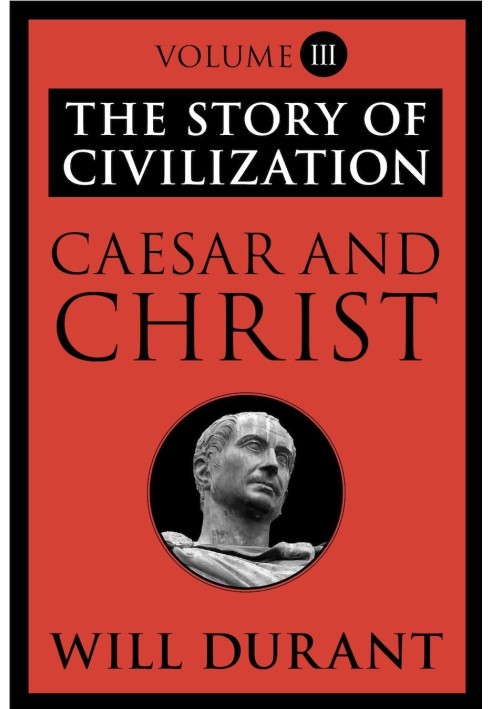Story of Civilization, by husband and wife Will and Ariel Durant, is an 11-volume set of books covering Western history for the general reader. The series was written over a span of more than five decades. It totals four million words across nearly 10,000 pages, with 2 further books in production at the time of the authors' deaths.[1]III. Caesar and Christ (1944)Bust of Julius CaesarBust of Julius CaesarThe volume covers the history of Rome and of Christianity until the time of Constantine the Great. Introduction: OriginsEtruscan Prelude: 800–508 BCThe Republic: 508–30 BCThe Struggle for Democracy: 508–264 BCHannibal Against Rome: 264 BC-202 BCStoic Rome: 508–202 BCThe Greek Conquest: 201 BC-146 BC"The new generation, having inherited world mastery, had no time or inclination to defend it; that readiness for war which had characterized the Roman landowner disappeared now that ownership was concentrated in a few families and a proletariat without stake in the country filled the slums of Rome." (p. 90)The Revolution: 145–30 BCThe Agrarian Revolt: 145–78 BCThe Oligarchic Reaction: 77–60 BCLiterature Under the Revolution: 145–30 BCCaesar: 100–44 BCAntony: 44–30 BC"Children were now luxuries which only the poor could afford." (p. 134)The Principate: 30 BC-AD 192Augustan Statesmanship: 30 BC-AD 14The Golden Age: 30 BC-AD 18The Other Side of Monarchy: AD 14–96The Silver Age: AD 14–96Rome at Work: AD 14–96Rome and Its Art: 30 BC-AD 96Epicurean Rome: 30 BC-AD 96Roman Law: 146 BC-AD 192The Philosopher Kings: AD 96–180Life and Thought in the Second Century: AD 96–192"If Rome had not engulfed so many men of alien blood in so brief a time, if she had passed all these newcomers through her schools instead of her slums, if she had treated them as men with a hundred potential excellences, if she had occasionally closed her gates to let assimilation catch up with infiltration, she might have gained new racial and literary vitality from the infusion, and might have remained a Roman Rome, the voice and citadel of the West." (p. 366)The Empire: AD 146-AD 192ItalyCivilizing the WestRoman GreeceThe Hellenistic RevivalRome and Judea: 132 BC-AD 135The Youth of Christianity: 4 BC-AD 325Jesus: 4 BC-AD 30The Apostles: AD 30–95The Growth of the Church: AD 96–305The Collapse of the Empire: AD 193–305The Triumph of Christianity: AD 306–325Epilogue"Rome was not destroyed by Christianity, any more than by barbarian invasion; it was an empty shell when Christianity rose to influence and invasion came." (p.667-668)The text of the book was translated from the original language using an artificial intelligence program. For the most part, the translation of the text is of very high quality, but in some cases, due to the imperfection of the technology, there may be incorrect phrase translations in the text, as well as single words and expressions may not be translated.
The text of the book was translated from the original language using an artificial intelligence program. For the most part, the translation of the text is of very high quality, but in some cases, due to the imperfection of the technology, there may be incorrect phrase translations in the text, as well as single words and expressions may not be translated.
 Instant download
Instant download
 Wide range of formats
Wide range of formats
 Full book
Full book





















